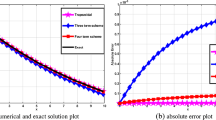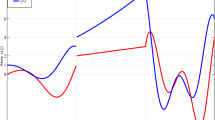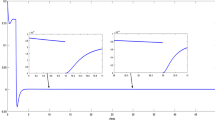Abstract
The present paper is dealt with the problem of the instability and unboundedness of impulsive differential systems. Numerous impulsive control systems were reported in the literature. The existing results give sufficient conditions for stability or boundedness of the system. If a system fails such conditions, it might be stable or unstable, bounded or unbounded. The most dangerous among these possible cases are unstable and unbounded ones. To our best knowledge, no criterion is available now to check these two cases. Thus, this paper presents some sufficient conditions on instability and unboundedness of impulsive systems, specializes them to Lurie control systems, and validates them with three illustrative examples.
Similar content being viewed by others
References
S. Haykin, Neural Networks, Prentice Hall, New Jersey. NJ, 1999.
B. Liu, C. Dou, and D. Hill, “Robust exponential input-tostate stability of impulsive systems with an application in micro-grids,” Systems & Control Letters, vol. 65, pp. 64–73, 2014.
A. Churilov, A. Medvedev, and P. Mattsson, “Periodical solutions in a pulse modulated model of endocrine regulation with time-delay,” IEEE Transactions on Automatic Control, vol. 59, no. 3, pp. 728–733, 2014.
Z. Liu, S. Zhong, and X. Liu, “Permanence and periodic solutions for an impulsive reaction-diffusion food-chain system with ratio-dependent functional response,” Communications in Nonlinear Science and Numerical Simulation, vol. 19, no. 1, pp. 173–188, 2014.
X. Li and J. Cao, “An impulsive delay inequality involving unbounded time-varying delay and applications,” IEEE Transactions on Automatic Control, vol. 62, no. 7, pp. 3618–3625, 2017.
J. Lu, D. Ho, and J. Cao, “A unified synchronization criterion for impulsive dynamical networks,” Automatica vol. 46, no. 7, pp. 1215–1221, 2010.
G. Arthi, Ju H. Park, and H. Y. Jung, “Existence and exponential stability for neutral stochastic integrodifferential equations with impulses driven by a fractional Brownian motion,” Communications in Nonlinear Science and Numerical Simulation, vol. 32, pp. 145–157, 2016.
V. Lakshmikantham, D. Bainov, and P. Simeonov, Series in Modern Applied Mathematics: Vol. 6. Theory of Impulsive Differential Equations, World Scientific Publishing Co, NJ, Teaneck, NJ, 1989.
D. Bainov and P. Simeonov, Systems with Impulse Effect: Stability Theory and Applications, Ellis Horwood, Chichester. UK, 1989.
W. Haddad, V. Chellaboina, and S. Nersesov, Impulsive and Hybrid Dynamical Systems: Stability, Dissipativity, and Control, Princeton University Press, New Jersey, NJ, 2006.
A. Samoilenko and N. Perestyuk, Impulsive Differential Equations, World Scientific, 1995.
T. Yang, Impulsive Control Theory, Springer, Berlin, 2001.
I. Stamova, Stability Analysis of Impulsive Functional Differential Equations, De Gruyter Expositions in Mathematics, Berlin, 2009.
X. Liao, L. Wang, and P. Yu, Stability of Dynamical Systems, Elsevier, 2007.
W. Zhang, Y. Tang, and X. Wu, “Synchronization of nonlinear dynamical networks with heterogeneous impulses,” IEEE Transactions on Circuits and Systems I: Regular Papers, vol. 61, no. 4, pp. 1220–1228, 2014.
X. Li, X. Zhang, and S. Song, “Effect of delayed impulses on input-to-state stability of nonlinear systems,” Automatica, vol. 76, pp. 378–382, 2017.
X. Zhang and X. Li, “Input-to-state stability of non-linear systems with distributed-delayed impulses,” IET Control Theory & Applications, vol. 11, no. 1, pp. 81–89, 2017.
W. Chen, X. Lu, and W. Zheng, “Impulsive stabilization and impulsive synchronization of discrete-time delayed neural networks,” IEEE Transactions on Neural Networks and Learning Systems, vol. 26, no. 4, pp. 734–748, 2015.
F. Amato, R. Ambrosino, M. Ariola, and C. Cosentino, “Finite-time stability of linear time-varying systems with jumps,” Automatica, vol. 45, no. 5, pp. 1354–1358, 2009.
Y. Yang, Y. He, Y. Wang, and M. Wu, “Stability analysis for impulsive fractional hybrid systems via variational Lyapunov method,” Communications in Nonlinear Science and Numerical Simulation, vol. 45, pp. 140–157, 2017.
J. Lu, D.W. C. Ho, and J. Cao, “Single impulsive controller for globally exponential synchronization of dynamical networks,” Nonlinear Analysis: Real World Applications, vol. 14, no. 1, pp. 581–593, 2013.
Z. Tang, J. H. Park, and J. Feng, “Impulsive effects on quasi-synchronization of neural networks with parameter mismatches and time-varying delay,” IEEE Transactions on Neural Networks and Learning Systems, vol. 29, no. 4, pp. 908–919, 2018.
X. Li and S. Song, “Stabilization of delay systems: delaydependent impulsive control,” IEEE Transactions on Automatic Control, vol. 62, no. 1, pp. 406–411, 2017.
X. Li and J. Wu, “Stability of nonlinear differential systems with state-dependent delayed impulses,” Automatica, vol. 64, pp. 63–69, Feb 2016.
F. Yao, J. Cao, P. Cheng, and L. Qiu, “Generalized average dwell time approach to stability and input-to-state stability of hybrid impulsive stochastic differential systems,” Nonlinear Analysis: Hybrid Systems, vol. 22, pp. 147–160, 2016.
W. Chen, S. Luo, and W. X. Zheng, “Generating globally stable periodic solutions of delayed neural networks with periodic coefficients via impulsive control,” IEEE Transactions on Cybernetics, vol. 47, no. 7, pp. 1590–1603, 2017.
X. Li and S. Song, “Impulsive control for existence, uniqueness and global stability of periodic solutions of recurrent neural networks with discrete and continuously distributed delays,” IEEE Transactions on Neural Networks and Learning Systems, vol. 24, no. 6, pp. 868–877, 2013.
V. Lakshmikantham, S. Leela, and S. Kaul, “Comparison principle for impulsive differential equations with variable times and stability theory,” Nonlinear Analysis: Theory, Methods & Applications, vol. 22, no. 4, pp. 499–503, 1994.
B. Liu and D. J. Hill, “Comparison principle and stability of discrete-time impulsive hybrid systems,” IEEE Transactions on Circuits and Systems I: Regular Papers, vol. 56, no. 1, pp. 233–245, 2009.
X. Wu, Y. Tang, and W. Zhang, “Input-to-state stability of impulsive stochastic delayed systems under linear assumptions,” Automatica, vol. 66, pp. 195–204, 2016.
B. Zhou and A. Egorov, “Razumikhin and Krasovskii stability theorems for time-varying time-delay systems,” Automatica, vol. 71, pp. 281–291, 2016.
J. Hale and S. Lunel, Introduction to Functional Differential Equations, Springer, Berlin, 1993.
X. Chen, J. H. Park, and J. Cao, “Sliding mode synchronization of multiple chaotic systems with uncertainties and disturbances,” Applied Mathematics and Computation, vol. 308, pp. 161–173, 2017.
X. Li, M. Bohner, and C. Wang, “Impulsive differential equations: Periodic solutions and applications.” Automatica, vol. 52, pp. 173–178, 2015.
O. M. Kwon, M. J. Park, and J. H. Park, “New and improved results on stability of static neural networks with interval time-varying delays,” Applied Mathematics and Computation, vol. 239, pp. 346–357, 2014.
V. Lakshmikantham and S. Leela, Differential and Integral Inequalities, Academic Press, 1969.
Z. Tang, J. H. Park, and H. Shen, “Finite-time cluster synchronization of Lur’e networks: a nonsmooth approach,” IEEE Transactions on Systems, Man, and Cybernetics: Systems, In press.
X. Liu, K. L. Teo, and Y. Zhang, “Absolute stability of impulsive control systems with time delay,” Nonlinear Analysis: Theory, Methods & Applications vol. 62, no. 3, pp. 429–453, 2005.
Author information
Authors and Affiliations
Corresponding author
Additional information
Recommended by Editor Jessie (Ju H.) Park. This work was supported by National Natural Science Foundation of China (11301308, 61673247), and the Research Fund for Distinguished Young Scholars and Excellent Young Scholars of Shandong Province (JQ201719, ZR2016JL024).
Xiaodi Li received the B.S. and M.S. degrees from Shandong Normal University, Jinan, China, in 2005 and 2008, respectively, and the Ph.D. degree from Xiamen University, Xiamen, China, in 2011, all in applied mathematics. He is currently a Professor with the School of Mathematics and Statistics, Shandong Normal University. From Nov. 2014 to Dec. 2016, he was a Visiting Research Fellow at Laboratory for Industrial and Applied Mathematics in York University, Canada, and the University of Texas at Dallas, USA. In 2017, he was working as Visiting Research Fellow at the Department of Mathematics, City University of Hong Kong, Hong Kong. He has received the May 4th Youth Award of Shandong province, China, in 2016. He has authored or coauthored more than 70 research papers. His current research interests include stability theory, delay systems, impulsive control theory, artificial neural networks, and applied mathematics.
Wu-Hua Chen received the B.Sc. degree in Mathematics from Hubei Normal University, Huangshi, China, the M.Sc. degree in Basic Mathematics from Guangxi Normal University, Guilin, China, and the Ph.D. degree in Control Theory and Control Engineering from Huazhong University of Science and Technology, Wuhan, China, in 1988, 1991, and 2004, respectively. From 1991 to 2001, he was with Guangxi University for Nationalities, Nanning, China. In September 2001, he joined Guangxi University, Nanning, China, where he is currently a Professor. From April 2005 to October 2005, from July 2007 to January 2008, and from September 2008 to July 2009, he was a visiting fellow in University of Western Sydney, Australia. From January 2017 to February 2017, he was a temporary research scientist in the Science Program at Texas A&M University at Qatar. His research interests include time-delay systems, impulsive systems, switched systems, and reaction-diffusion systems.
Wei Xing Zheng received the B.Sc. degree in Applied Mathematics in 1982, the M.Sc. degree in Electrical Engineering in 1984, and the Ph.D. in Electrical Engineering in 1989, all from Southeast University, Nanjing, China. He is currently a Professor at Western Sydney University, Sydney, Australia. Over the years he has also held various faculty/research/visiting positions at Southeast University, China; Imperial College of Science, Technology and Medicine, UK; University of Western Australia; Curtin University of Technology, Australia; Munich University of Technology, Germany; University of Virginia, USA; and University of California-Davis, USA. His research interests are in the areas of systems and controls, signal processing, and communications. Currently, he is an Associate Editor for Automatica, IEEE Transactions on Automatic Control, and other scholarly journals. He is a Fellow of IEEE.
Qing-Guo Wang received, respectively, the B.E. in Chemical Engineering in 1982, the M.E. in 1984 and Ph.D. in 1987 both in Industrial Automation, all from Zhejiang University, China. Since 1992 he has been with the Department of Electrical and Computer Engineering of the National University of Singapore where he is currently a Full Professor. He held an Alexander von Humboldt Research Fellowship of Germany from 1990 to 1992. His present research interests are mainly in modeling, estimation, prediction, control, optimization and automation for complex systems, including but not limited to, industrial and environmental processes, new energy devices, defense systems, medical engineering, and financial markets. He has published more than 300 technical papers, of which 230 are in international journals. He received over 8500 citations with h-index of 51 and the Automatica most cited article in 2006–2010. He was in the Thomson Reuters list of highly cited researchers 2013 (one of 250 in Engineering worldwide). He has authored or coauthored six books and co-holds six patents in USA and Singapore, two of which have been licensed to USA. He was a General Chair for three international control conferences. He is currently the Deputy Editor-in-Chief of the ISA Transactions (USA).
Rights and permissions
About this article
Cite this article
Li, X., Chen, WH., Zheng, W.X. et al. Instability and Unboundedness Analysis for Impulsive Differential Systems with Applications to Lurie Control Systems. Int. J. Control Autom. Syst. 16, 1521–1531 (2018). https://doi.org/10.1007/s12555-017-0609-x
Received:
Revised:
Accepted:
Published:
Issue Date:
DOI: https://doi.org/10.1007/s12555-017-0609-x




